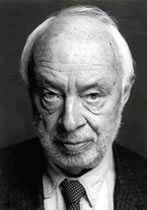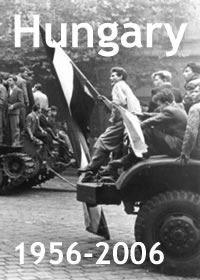Hungary 1956-2006
Many older Dutch people still clearly remember the days of the Hungarian Uprising in October 1956. Reports of tanks in the streets of Budapest, mostly on the radio, came in bits and drabs. People in the Netherlands began to hoard in response to the turnaround in events, frightening one another with tales of the impending ‘Third World War’. Memories of the repression and horrors of the last World War, only ten years before, were still fresh. A programme of events commemorating the uprising is taking place from September through November, 2006 in Budapest (Hungary).
The complete programme can be found on www.sica.nl and www.du-fle.hu, these are the items involving literature:
Lectures and discussion: The Netherlands-Hungary Interactions
- October 31, 2006, 7:00-9:00 p.m.
- Merlin Theatre, 1052 Budapest, Gerlóczy u. 4

At the end of October 1956, Henk Hofland travelled to Budapest, where the revolution had been going on for several days. On the night of November 3rd, he listened to the Russian tanks arriving in the capital. Nagy Imre, the Prime Minister, informed the populace of this over the radio, then went on to say, ‘Help Hungary, the Hungarian people, the Hungarian workers, the scientists, the intelligentsia, S.O.S.’ Not long after that, the radios went silent. Hofland later stated, ‘I knew that freedom had lost and that the West wouldn’t help.’ The West didn’t get involved, but there was a reaction, and numerous demonstrations – thousands went into the streets in Europe’s large cities, and they also surrounded the Communist Party headquarters in Amsterdam.
The central question of the Merlin Theatre’s programme is: what can we say, 50 years after the events of 1956, about the historic and intellectual consequences of the revolution and its defeat? What effects did the events have on Europe? What is the historical significance of the 1956 revolution for Holland?
Two Dutch writers, Henk Hofland and Cees Nooteboom and sociologist Hans Olink will give short presentations. The meeting will be moderated by the philosopher and writer Földényi László. His book about the 1956 revolution examines the agitated atmosphere that resulted, and will be published in November.
Cees Nooteboom is a world-renown Dutch writer who was in Budapest during the 1956 revolution. Several of his books have been translated into Hungarian.
Presentation of the Hungarian translation of In Conflict with Reality: The 1956 Cold Civil War in Amsterdam, by Hans Olink
- November 2006
- Published by the Institute for the History of the 1956 Hungarian Revolution
After the Soviet Army’s entry into Budapest, thousands poured onto the streets in Holland to destroy anything that reminded of Communism. Thus it was that for days, the Dutch Communist Party (CPN) stronghold was besieged by demonstrators. How was it possible that a foreign event could cause such hysterical, reactionary fervour? The Communists, the ‘Moscow buddies’, became the scapegoats. In Amsterdam, there were constant demonstrations and clashes. Hans Olink describes the Soviet entry into Budapest by way of conversations with eye witnesses to the events in Amsterdam between November 4th and November 10th, and in the context of the cold war.
Olink is a sociologist and an editor for the Dutch VPRO OVT television broadcasts. His published work includes De vermoorde droom (The Murdered Dream), Nederlandse idealisten in Sovjet-Rusland (Dutch Idealists in Soviet Russia), Vrouwen van Vught (The Vught Girls) and Een nacht in een concentratiekamp (One Night in a Concentration Camp).
Cafe Foreign Affairs: Commemorating the 50th Anniversary of the Hungarian Uprising
- 3 November 2006, 7:45 p.m.
- Felix Meritis, Keizersgracht 324, Amsterdam
This programme takes a look back at the events of 1956 and a look forward to their consequences today and for the future. This meeting will be opened by Gábor Szentiványi, the Hungarian Ambassador in the Netherlands. Brief lectures by Hans Olink, Max Nord and Vera Illès follow, which will be concluded by a forum discussion. In addition, a new documentary for Andere Tijden (Other Times), a Dutch NPS/VPRO television programme will be shown, about those who fled Hungary for the Netherlands in 1956, as well as a report from the 23 April 2002 broadcast on the storming of the Felix Meritis building after the Hungarian Uprising was crushed by Russian forces. The evening will conclude with music by Peter Scholcz and his Friends.
More information
- The complete programme
Published: October 22, 2006 news

